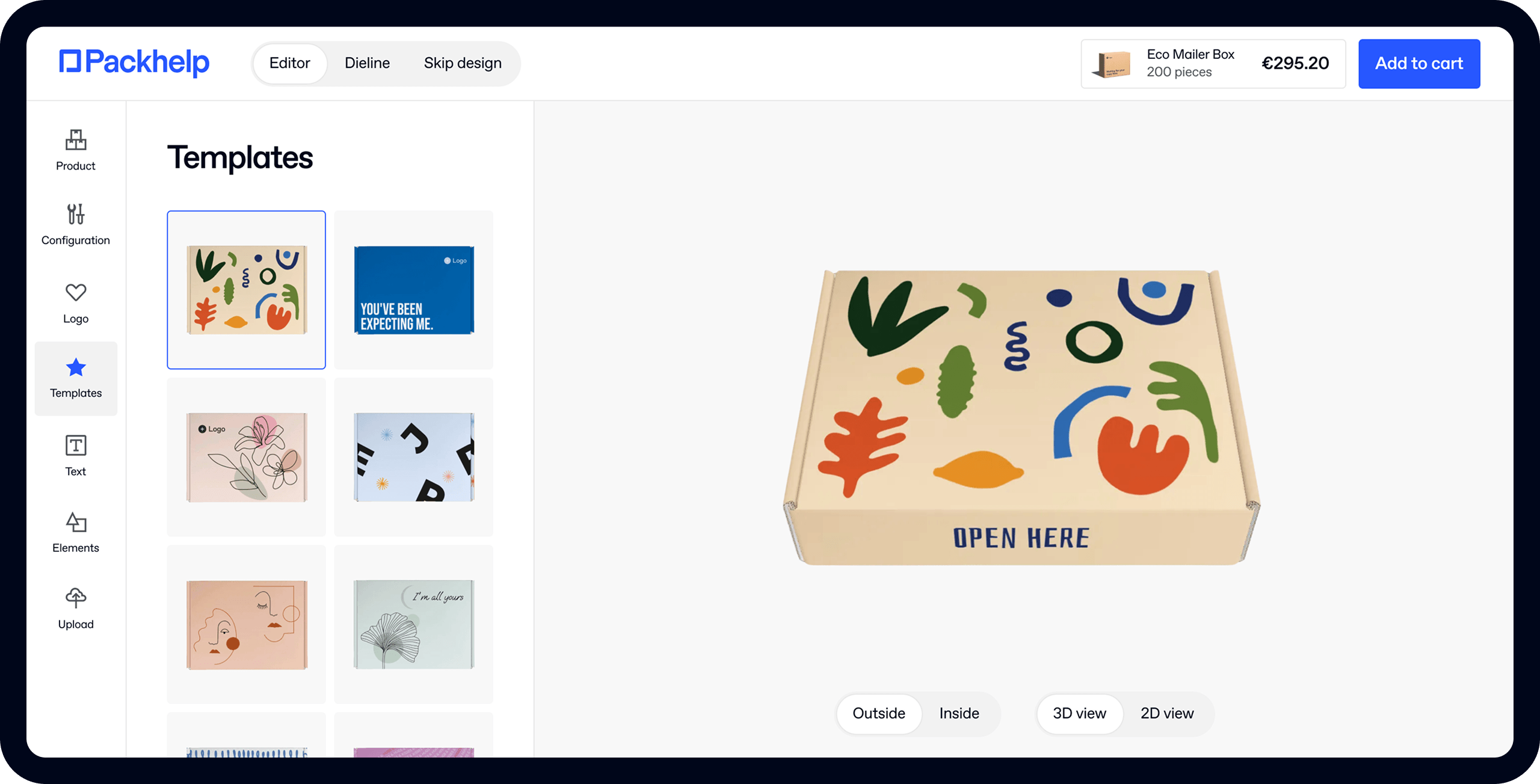Why It’s Worth Investing in Fulfilment: Sustainability, Scalability & Modernisation

- 200+ templates & patterns
- Real time 3D packaging preview
- Upload logo and choose brand colours

Subscribe now! Receive 15% discount.
Don’t miss out – get 15% off your first order when you join the newsletter. It’s fast, free, and kinda smart.
You're now subscribed!
In this article:
It's a real challenge to run an online store these days - competition is growing at an alarming rate and so are customer expectations.
As the data shows, only last year retail e-commerce sales amounted to $4.9 trillion U.S. dollars worldwide.
In that same study, analysts predict that its value will grow by 50% to reach $7.4 trillion by 2025.
The industry is therefore developing rapidly and is not slowing down - but this does not mean that it does not face typical logistical problems.
Fulfilment to the rescue
The quicker your business grows, the more you need to ship - and the more inventory you need to deliver (and a place to store items before shipping to the end customer).
It's hard to take care of collecting orders, storing, packing, shipping, as well as dealing with reverse logistics yourself - especially since today's buyers are not very forgiving of mistakes and if something goes wrong.

Assuming you sell the best quality and most innovative product on the market - without providing a state-of-the-art customer experience your online sales will unfortunately not succeed.
Especially when the investment needed to acquire customers is high and is not returned with the first purchase. The most critical thing for e-commerce is to make customers returning, loyal and brand ambassadors to optimise LTV.
And as we all know - social proof is a really powerful tool, which acts as a double-edged weapon.

As TrustPilot's data shows, more and more people are making purchasing decisions based on reviews from other customers. As many as 9 out of 10 customers look at online reviews before buying online, which statistically is 90% - a figure that cannot be ignored.
So, is it even possible to grow a business and scale it to foreign markets while maintaining the highest possible quality of service?
Fortunately, we've got some good news on this topic - of course, it is, as long as you give yourself a hand and decide to work with an international fulfilment service provider.
Moreover, such cooperation pays off not only because it takes eCommerce owners off the hook - but also because of measurable profits.
The numbers speak for themselves - almost 80% of companies with a well-functioning supply chain achieve revenue growth higher than the average for the industry.
So, in the long-run perspective, the game is undoubtedly worth the proverbial candle.
But what are fulfilment logistics?

In the simplest terms, it is the management of a supply chain so that all elements (from the storing of products in the warehouse to the processing of returns from customers) operate smoothly and without complaint.
This service ensures that all logistical challenges are placed in the hands of true industry experts - allowing businesses selling online to focus on growing their firms further.
D2C companies: we are here for you
The D2C business model can work in literally any industry and is implemented by both small companies, such as manufacturers of organic cosmetics or supplements, and large brands producing hygiene products, accessories, or clothing.
An example is P&G, which is also building a direct online channel in this model.
In their case, it is an additional sales channel and a way to maintain the highest possible margin and position in the value chain.
There are many reasons why buying from D2C sellers is very popular among online shoppers.
As statistics show, the main one is the possibility to get a better price; free delivery and free returns offered in most cases are also on the podium.

Due to the specifics of running this kind of business, the logistics needs of such companies are also special and can be a real challenge.
D2C companies are usually independently responsible for everything related to shipping: packaging, delivery, possibly warehousing issues and handling returns.
Considering that most of the time this business model is chosen by small and medium-sized companies operating on a smaller scale rather than large manufacturing firms, it is a lot of work to handle.
Thus, they need also to be spending time on related tasks instead of e.g., taking care of business growth, further development of the company and acquiring new customers.
The typical fulfilment service provider can meet all the above-mentioned needs of a D2C business, but expand into foreign markets - which is covered below.

But it's not just logistics - coordinating operations on an international level is a real challenge, even for technologically aware and advanced companies.
That's why network solutions are becoming so important, and D2C business owners are able to appreciate them accordingly.
Let's face it - the freedom to put all the logistics issues in the hands of professionals who will take on this work for you is a real heartbeat - and the ability to focus on marketing, customer needs, and business development.
The support in international relations can also be an invaluable advantage.
Going global: focus on business growth
Iit is not too much to say that every company dreams of growth - including, in the long term, reaching out to new markets, not just local ones.
This is a great opportunity to benefit from new revenue potential, outpace the competition or highlight global brand exposure.
As data compiled by Zion Research shows, cross border is really the future of the ecommerce industry - in 2018, the market was worth ("only") $562.1 billion; by 2027, however, it is expected to be... $4 trillion.
Let's just add that the CAGR (compound annual growth rate) in this situation will be 27.4%.
Unfortunately, before your product hits new markets, you have to face several challenges.
Stepping out of your comfort zone and blazing a trail in these markets involves a really big dose of issues that you have to overcome - both for you, as a seller, and for your customers.
What is problematic for online shoppers is the high cost of delivery, the long waiting time for the parcel, and the problems with returning unwanted items.

You, on the other hand, as an eCommerce owner have to deal with distance, slow logistics, complicated formalities, finding the right partner in each market (that costs both time and money), and complicated IT integrations – we truly understand that way to global sales can be a real challenge, with an extreme risk involved in the whole process.
Fortunately, there is also good news - we've got a very simple solution to deal with these problems quickly.
This is the fulfilment network.
As the name implies, it is not a service provided by a single logistics operator, which is usually territorially limited to a certain geographic area.
It is access to the services of numerous provider-partners who cover the entire continent, with warehouses located in each country, ensuring local delivery.
By using a fulfilment network you can easily sell in your chosen markets offering shipping costs at the same level as regional players.
And this is only the beginning of the notable benefits arising from such cooperation.
If you choose a good offer, no matter if you're a relatively small business or a big player, the time of entry into a new market and achieving success is really fast.
Global reach and different markets are really within your grasp - without much effort. Let me just give you an example - in Linker Cloud we are able to provide such things in a week, in almost all European countries.
And we guarantee that regardless of the chosen pan-European destination, the package will reach the end recipient within 24 hours from the moment of order placement.
Below you'll find some important advantages of using fulfilment services:
- scalability - by betting on fulfilment solutions, you'll gain direct insights considering your chosen country; thanks to this you can easily boost the whole sale process and smoothly reach your target market;
- cost- and time- savings - by placing logistics in the hands of professionals, you do not have to waste time and additional resources on finding local warehouses, couriers and other subcontractors; searching for partners and negotiating with them is done for you - as is dealing with local laws, taxes and regulations;
- experts' knowledge and contacts - as specialists working in logistics for years, fulfilment providers have a really good understanding of the market needs. Their understanding of the market will allow you to gain greater control of the whole process and be sure to invest in the best technology.
Fulfilment & logistics go green
Air pollution and global warming are undeniable facts.
As an ecommerce industry and its associated logistics, we, unfortunately, contribute a great deal to this.
The demand for transport itself has a growth perspective. A January 2020 WEF report predicts that demand for freight will triple by 2050, while demand for air transport will double.
We must therefore focus both on green living as consumers and on responsible business.
There is good news, however: as an industry, we can take care of the environment and natural resources, of reducing our carbon footprint and of waste reduction.
What is more, such behaviour is also expected by customers themselves.
As shown by research carried out by the Simon-Kucher & Partners company, over 30% of millennial online shoppers over the past five have made deliberate steps towards more sustainable soups. Moreover, almost 80% of all buyers, regardless of age group, identify green shopping and the need to care for the environment also when making purchasing decisions as extremely important factors.

But how is fulfillment going to do that? The answer is simple and is based on several elements.
First of all, by using networked fulfillment services, you have access to a really large amount of distribution centers and warehouses.
Thanks to this, with data on distribution stocks across regions, you can manage the shipping strategically - and ship the goods from the closest place to the customer instead of bringing it to the final recipient from another country.
You are thus contributing to the reduction of the transport route and the pollution associated with it.
Secondly - you can choose eco-friendly packaging.
Today's market really gives you a huge range of sustainable packaging options: from fillers made of recycled materials, through biodegradable packaging, to the use of compostable packaging.
Customers love such eco-initiatives, which simply have a real impact on less waste generating.
It is also important to focus on so called green deliveries, which consists of several key activities:
- a shift from heavy, sulfur-rich fuels used on ships to biofuels based on natural resources, natural gas and exhaust gas cleaning systems,
- gradual replacement of the fleet with hybrid and electric cars,
- joining carbon offsets programs and eco-projects such as forest planting,
- development of route planning and optimization applications that complement the above-mentioned activities, allowing real-time changes to be made, depending on the traffic volume.
One of the shades of these activities is the addition of slower deliveries to the last mile offer, which are great option for environmental freaks - the lower the speed, the lower the fuel consumption, and therefore the lower the carbon footprint.
The customers who opt for it are those who find it an extra value.
Summing Up
A better understanding of the market challenges and the needs of online shoppers poses new challenges for the logistics industry. A key to success for retailers and further growth in a long run perspective is choosing right business partners, providing outstanding logistics solutions and allowing them to save money.
In one of the stages of business development, the outsourcing of logistics to 3PL company will be a good solution, as it will give space for continued growth.
Once the business reaches a stable position in the home country and there would be a desire to expand abroad in all likelihood, such cooperation will be insufficient.
That is exactly why it is worth putting on collaborating with the networked fulfillment services.
Retailers struggle with a huge amount of logistical challenges and issues, and it doesn't have to be this way. As an eCommerce owner, you can still have full control over stocking, shipping, dispatch and returns - as long as you let go of the burden of running these things on your own shoulders and rely on fulfillment.













